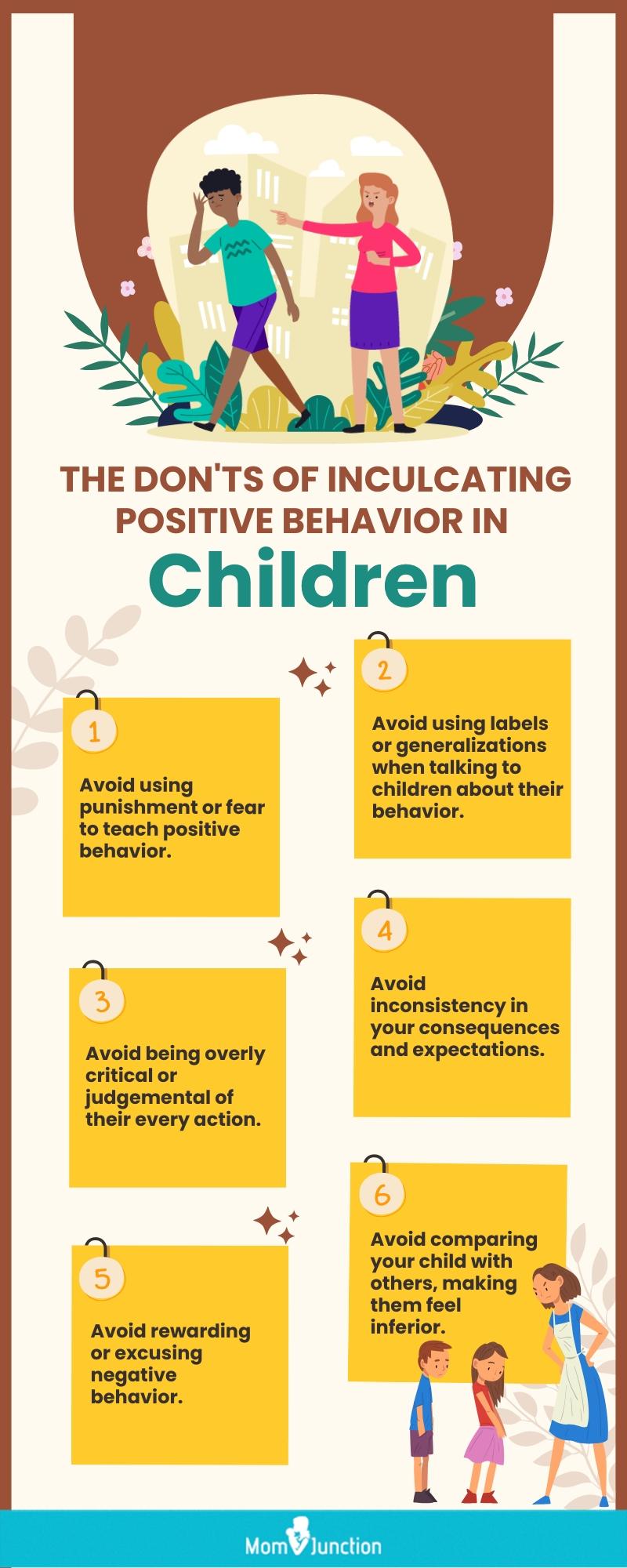
Image: ShutterStock
Inculcating positive behavior in children has to be one of the most important tasks that parents have to perform. Making sure that you teach them positive behavioral traits and helping them become respectable citizens in society is every parent’s bounden duty. So how do you do it? Plunge into this post as we have put together a list of positive behaviors that you should introduce your children to and some easy tips to help you do so.
7 Effective Ways To Promote Positive Behaviors In Children
To make sure children grow up to be good adults, encouraging positive behavior in children is very essential for parents. Consistency, alertness and the below measures are necessary as well, but above all, as a parent, you need to be ready and equipped to go on this journey.
1. Be a role model
Image: IStock
Children tend to learn by observing. Hence if you want your children to portray positive behavior, ensure that you follow the same (1).
- For everything you do, your child is looking up to you. Be a role model; do not whine or swear in front of your children. While it is hard to be perfect always, remember that your children are always watching, so lead by example.
- Your child will build on that harmonious, realistic, positive aura you display in the house and grow into being a similar individual.
2. Pay heed
Listen to your children without interrupting, and without any judgment. Listening is a powerful tool that makes your child feel that they are part of the game (2).
- Inability to express their emotions can be difficult for children and may result in some unintentional behaviors.
- But by being there with them and giving them your attention, you help them conquer apprehension, anxiety, confidence issues if any.
3. Keep your word
Image: Shutterstock
Keeping up the promises shows integrity and builds respect for that individual. Teach your children the same by meeting your share of the deal.
- If you have committed a trip to the zoo in lieu of completing homework for the week, stick to your word.
- This way they learn the discipline of commitments and at the same time trust you for what you say.
4. Be cautious
Go an extra mile with your belongings if you do not want children to reach them.
- After all, they are kids and finding anything to play with is the only thing they know of, at this age.
- Hence, keep the valuables away from their sight.
- Be polite while posing the restriction on them. Explaining the condition may help them understand it better.
5. Learn to say ‘no’
Image: Shutterstock
It is very difficult to say ‘no’, but even more difficult to change stubborn behavior (3).
- You do not have to agree with everything. Doing so, you will give them wrong signals.
- When you say no to them, your child knows that it’s important to respect your say and follow ground rules.
 Caution
Caution6. Avoid preaching
Stop teaching your children what to do. Leave it up to them and you’ll be surprised with what your children can do (4).
- Sometimes, over-preaching will have the opposite effects! It is better to guide, not instruct.
- That’s how they learn to make their own decisions, be responsible for their own actions and become independent.
7. Do not tag them
Image: IStock
Tagging your kids as naughty or less intelligent or with other labels builds up negative emotions. You are not encouraging them to do better; instead, you are affecting their self confidence (5).
- If you want them to study, share its benefits with them. Without pressurizing, convey gently what you expect from them and why.
- Boosting their self esteem will bring out the best behavior in them.
 Quick tip
Quick tipFrequently Asked Questions
1. What are examples of positive behaviors?
Positive behaviors in children include an array of simple tasks that are generous, kind acts that enable them to work efficiently towards their and others’ well-being. These behaviors include cleaning up after themselves, volunteering in community programs, obeying the rules of a place, and respecting others’ choices. Understanding their responsibilities and keeping up to their promises could also be considered positive behaviors.
2. What is the importance of positive behavior?
Engaging in positive behaviors could help a child improve their quality of life. Such behaviors might help them maintain good relationships, keep things organized around the house and become better individuals.
Being a role model of positive behavior for your children will help them imbibe the qualities more effectively. It is important to teach children the importance of positive behavior to help them develop these behaviors as they grow up. Try applying these seven ways of promoting positive behavior in children and watch them grow into responsible and ideal adults. However, remember that these habits cannot be developed in a day. Being patient with your child and encouraging them throughout the process can go a long way.
Infographic: What To Avoid While Teaching Positive Behavior To Children
Teaching positive behaviors to children is important to help them develop healthy habits, build good character, and become responsible. However, certain things should be avoided while teaching positive behaviors to children. These can hinder the child’s development and prevent them from learning and adopting positive behaviors. Explore the infographic to know the things to avoid. Illustration: Momjunction Design Team
Get high-quality PDF version by clicking below.
Download Infographic
Key Takeaways
- Positive behaviors foster responsibility, harmony, realism, confidence, and discipline in children.
- Parents can promote positive behaviors by being role models and keeping promises.
- Non-judgmental listening, polite restrictions, clear yes/no ground rules, guidance, and avoiding labels can encourage positive behavior.
- Parents’ behaviors can impact their children’s trust, emotional expression, decision-making, and other psychological attributes.
References:
- Being a role model.
https://centerforparentingeducation.org/library-of-articles/focus-parents/role-model-promise-peril/ - The skill of active listening.
https://centerforparentingeducation.org/library-of-articles/healthy-communication/the-skill-of-listening/ - How to discipline your child the smart and healthy way?
https://www.unicef.org/parenting/child-care/how-discipline-your-child-smart-and-healthy-way - Teach your kids how to make their own decisions.
https://ptaourchildren.org/teach-kids-decision-making-skills/#:~:text=The%20power%20of%20empowerment - Avoid labeling your child.
https://extension.unr.edu/publication.aspx?PubID=3011 - How to teach good behavior : Tips for parents.
https://www.aafp.org/pubs/afp/issues/2002/1015/p1463.html - Encouraging good behavior: 15 tips
https://raisingchildren.net.au/toddlers/behaviour/encouraging-good-behaviour/good-behaviour-tips




















